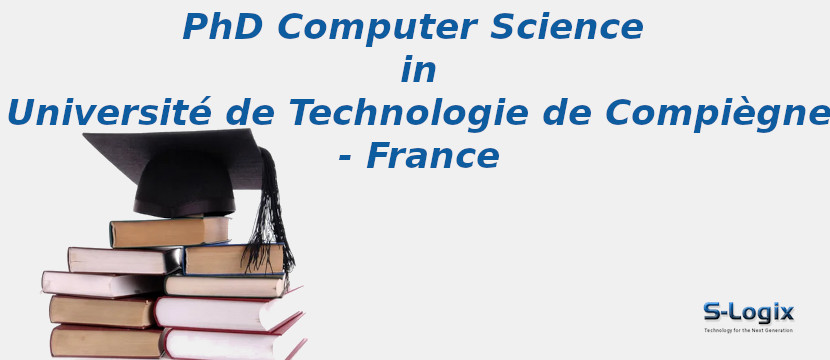The Université de Technologie de Compiègne Is a French institution based in Compiègne and founded in 1972. Université de Technologie de Compiègne is famous for its engineering programs and research activities in various fields.
Université de Technologie de Compiègne comprises four main academic departments: Mechanical Engineering, Electrical Engineering and Computer Science, Industrial Engineering, and Applied Sciences.
The Université de Technologie de Compiègne furnishes undergraduate, graduate, and doctoral programs in several disciplines, including engineering, computer science, management, and applied sciences.
Université de Technologie de Compiègne is known for its research activities in a variety of fields, such as robotics, artificial intelligence, nanotechnology, and sustainable development.
Université de Technologie de Compiègne equips tomorrow-s engineers, scientists, and managers as innovative, humanist persons proficient in handling and mastering complicated situations in contemporary information and communications-intensive society.
Address: Rue Roger Couttolenc, 60200 Compiègne, France
Phone: +33 3 44 23 44 23
Email: accueil@utc.fr
Website: https://www.utc.fr/en/
Bachelor-s degree;
• Bachelor-s degree in Digital Engineering and Management (ID&M)
Master-s degree;
• Engineering and health technology management
• Railroad and Urban transportation systems
• Complex System Engineering (UTC-ISC)
• The vocational degree in Maintenance of Multi-technical Systems
• Specialty program – Computer System Engineering (ISI)
• Specialty program – Artificial Intelligence and Data Sciences (IAD)
• Specialty program – Embedded Computing and Equipment and Autonomous Systems (INES)
The Université de Technologie de Compiègne in France has a strong focus on interdisciplinary research in computer science with a particular emphasis on areas such as
• Network architectures and technologies
• Distributed systems
• Internet application architectures and main technologies
• Computer System
• Advanced networks and Cloud
• Data Analysis and Machine Learning
• Knowledge management
Network architectures and technologies;
• Local networks
• network interconnection
• telecommunication and long-distance networks
• Internet
• TCP/IP
Distributed systems;
• Distributed algorithms
• modelling and proof techniques for distributed systems
• Distributed application architectures and main technologies
Internet application architectures and main technologies;
• Web architectures
• JEE
• HTML
• JavaScript
• CSS3
• PHP
• XML
• JSON
• servlets
• React
• Spring Framework
• sustainable web applications
• modularity
• server consumption
Computer System;
• System administration
• UNIX
• Linux
• system interconnection
• Computer security and dependability
• prevention
• protection and reaction techniques
• Multi-agent systems and coordination of autonomous processes
Advanced networks and Cloud;
• Internet of Things (loT)
• cybersecurity
• Cloud and Fog Computing
Data Analysis And Machine Learning;
• Factorial analysis
• automatic classification
• segmentation
• discriminant analysis
• decision trees
• artificial neural networks
Knowledge management;
• Knowledge extraction and management
• knowledge capitalization
• indexing and information retrieval
• rule-based and model-based reasoning
• reactive and cognitive agents
• The French-Mexican laboratory for computer science and automatic control systems
• Integrated transformation of renewable matter (TIMR)
• Enzyme and cell engineering (GEC) – UMR CNRS
• Bio-mechanics and bio-engineering (BMBI) – UMR CNRS
• Heuristics and diagnostics for complex systems (Heudiasyc) – UMR CNRS
• UTC-LMAC (Compiegne Applied Mathematics Laboratory)
• Marie Skłodowska-Curie Actions (MSCA)
• Erasmus Mundus Joint Master Degrees (EMJMDs)
• CIFRE (Convention Industrielle de Formation par la REcherche)
• Campus France Scholarships
• UTC-NAIST Joint International Research Program
• Erasmus+ Program
• Eiffel Excellence Scholarship Program
To admit to a Ph.D. program at Université de Technologie de Compiègne, applicants need to meet the following admission requirements:
• Applicants must have a master-s degree in a relevant field
• Applicants must be proficient in French or English, based on the language of instruction of the program that the applicants are applying.
• The minimum language requirements for Ph.D. programs at Université de Technologie de Compiègne are:
• French language proficiency: level B2 in accordance with the Common European Framework of Reference for Languages (CEFR)
• English language proficiency: TOEFL iBT score of at least 90 or IELTS score of at least 6.5
• Applicants need to submit a research proposal that describes the objectives, methodology, and expected outcomes of your proposed research project
• Applicant-s academic record will be evaluated, including grades, academic achievements, research experience, and publications
• Applicants need to submit letters of recommendation from two or three academic or professional references
